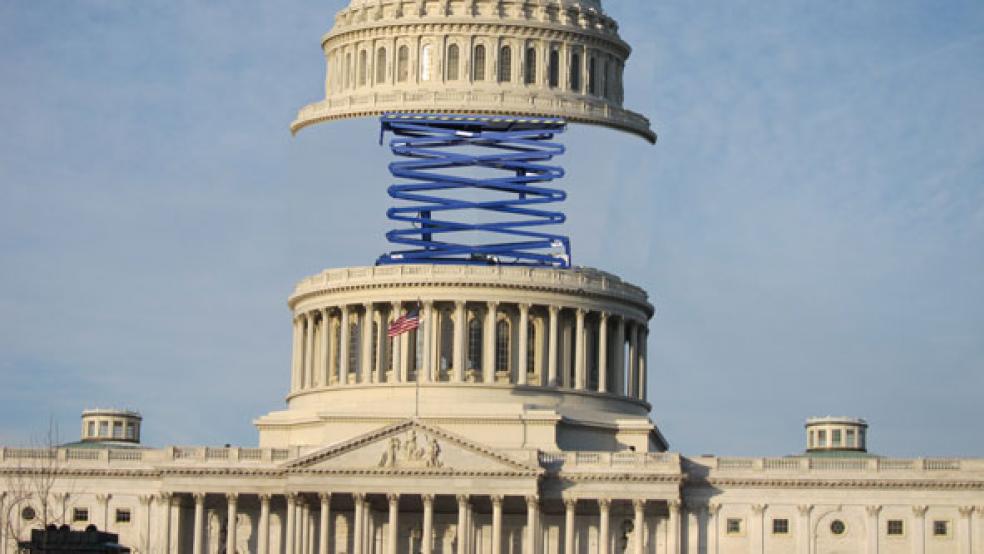President Trump had plenty to say Tuesday night before Congress about increased spending on defense, new infrastructure, a $23 billion wall along the southern border with Mexico and billions of dollars more for steep tax cuts – but nary a word about the looming $20 trillion national debt.
After frequent references to the historic flow of government red ink throughout his campaign, Trump was stone silent yesterday on the challenges of slowing the growth of publicly held debt, which currently is on track to grow to 77 percent of the overall economy by 2025, according to the Congressional Budget Office.
Related: Trump’s Lofty Vision of Renewal Comes with a Huge Price Tag
“That’s pretty remarkable,” said Robert L. Bixby, executive director of the Concord Coalition, an anti-deficit watchdog. “He should have at least teed up the problem and talked about the need for hard choices and bipartisan negotiations . . . and how he wants to put the nation in a better fiscal position.”
There are any number of reasons Trump may have decided to duck the subject of the debt, including a reluctance to have to explain to conservatives his campaign pledge not to cut Social Security and Medicare, the two premier federal entitlements that are the primary drivers of the long-term debt.
Yet a debate over entitlements and the long term debt will be unavoidable this year, especially when the government begins bumping up against its limit on borrowing to cover revenue shortages and must raise the debt ceiling or suffer the consequences of a first-ever default by the Treasury.
Raising the debt ceiling has always been a politically onerous task because neither party wants to be perceived by voters as accommodating runaway government spending. New debt ceiling authority almost always is decided in tandem with other major spending and tax disputes. And the party in power frequently must make concessions to the minority in order to corral enough votes to pass the debt ceiling legislation in the two chambers.
Related: Putting Trump’s ‘Historic’ $54 Billion Military Spending Boost Into Context
The stakes couldn’t be higher: Failure to raise the debt ceiling would do irreversible damage to the U.S. credit rating, trigger an uproar in U.S. and global markets, drive up the future cost of borrowing, postpone Social Security payments and tax returns, and force layoffs of non-essential government workers.
“It would be the kind of damaging blow to the U.S. economy that might not be correctible for a decade,” said Stan Collender, an authority on the federal budget and an economics blogger for Forbes. “After 250 years of the U.S. history, making interest payments on the debt was never a question. It would now be something that was at least in the back of the minds of all U.S. creditors.”
The Obama administration had several near misses on raising the debt ceiling during its stormy relations with congressional Republicans. In August 2011, Standard & Poor’s downgraded the government’s Triple-A rating after Congress and the White House deadlocked for weeks over a budget deal, and the Treasury came within an eyelash of defaulting. It took the intervention of Vice President Joe Biden and Senate Republican leader Mitch McConnell of Kentucky, two long-time friends, to save the day and avert an economic crisis.
In 2015, President Obama and Republican congressional leaders agreed to suspend the federal debt ceiling until March 15, 2017. After that date – barely two weeks from now – the Treasury will surpass its cumulative $20 trillion borrowing authority.
At that point, newly ensconced Treasury Secretary Steven Mnuchin is expected to order “emergency measures” to effectively buy more time for the government to pay its creditors and cover revenue shortfalls to keep the government operating.
Related: Debt Ceiling: What Is It and Why Does It Matter?
In the past, those emergency maneuvers have included delaying the reinvestment of assets in the Federal Employees’ Retirement System G-Fund, the Exchange Stabilization Fund and the civil service and postal retirement fund. By postponing those reinvestments, the Treasury slows the growth of its overall debt, or at least on paper.
Those steps would likely enable the Treasury to continue making all payments until at least mid-August, but it's unclear what would happen beyond then, according to Shai Akabas, the director of fiscal policy at the Bipartisan Policy Center and an expert on the debt ceiling.
The Trump administration and GOP leaders have yet to reveal their strategy for averting a debt ceiling crisis this summer, and it’s far from clear whether Senate and House Democrats will agree to cooperate or find ways to put up obstacles to increasing the Treasury’s borrowing authority.
Trump raised plenty of eyebrows during the campaign by lightly dismissing the importance of the debt ceiling. He suggested that if push came to shove, he would negotiate down the debt with the country’s biggest creditors, who include China and Japan.
Former Rep. Mick Mulvaney of South Carolina, the new director of the Office of Management and Budget, has long been a skeptic of the dangers of the Treasury defaulting on some of its debt.
Related: Mnuchin Says He Takes the Debt Ceiling More Seriously Than Trump
He said during his Senate confirmation hearing that while defaulting on America’s debts would have grave worldwide economic consequences, “I do not believe that breaching the debt ceiling will automatically or inevitably lead to that result.” That’s because Mulvaney and other conservatives contend that the government can “prioritize” its payments, with the biggest and most important creditor getting paid first while others would have to wait.
However, Mnuchin, the former Goldman Sachs banker and billionaire hedge fund manager, doused the concerns of lawmakers that Trump and Mulvaney might play games with the debt during his confirmation hearing before the Senate Finance Committee in January.
It was then that Mnuchin told Sen. Mark Warner (D-VA) that he agreed “100 percent” that Trump must never again question America’s willingness to stand by its debt obligation.





